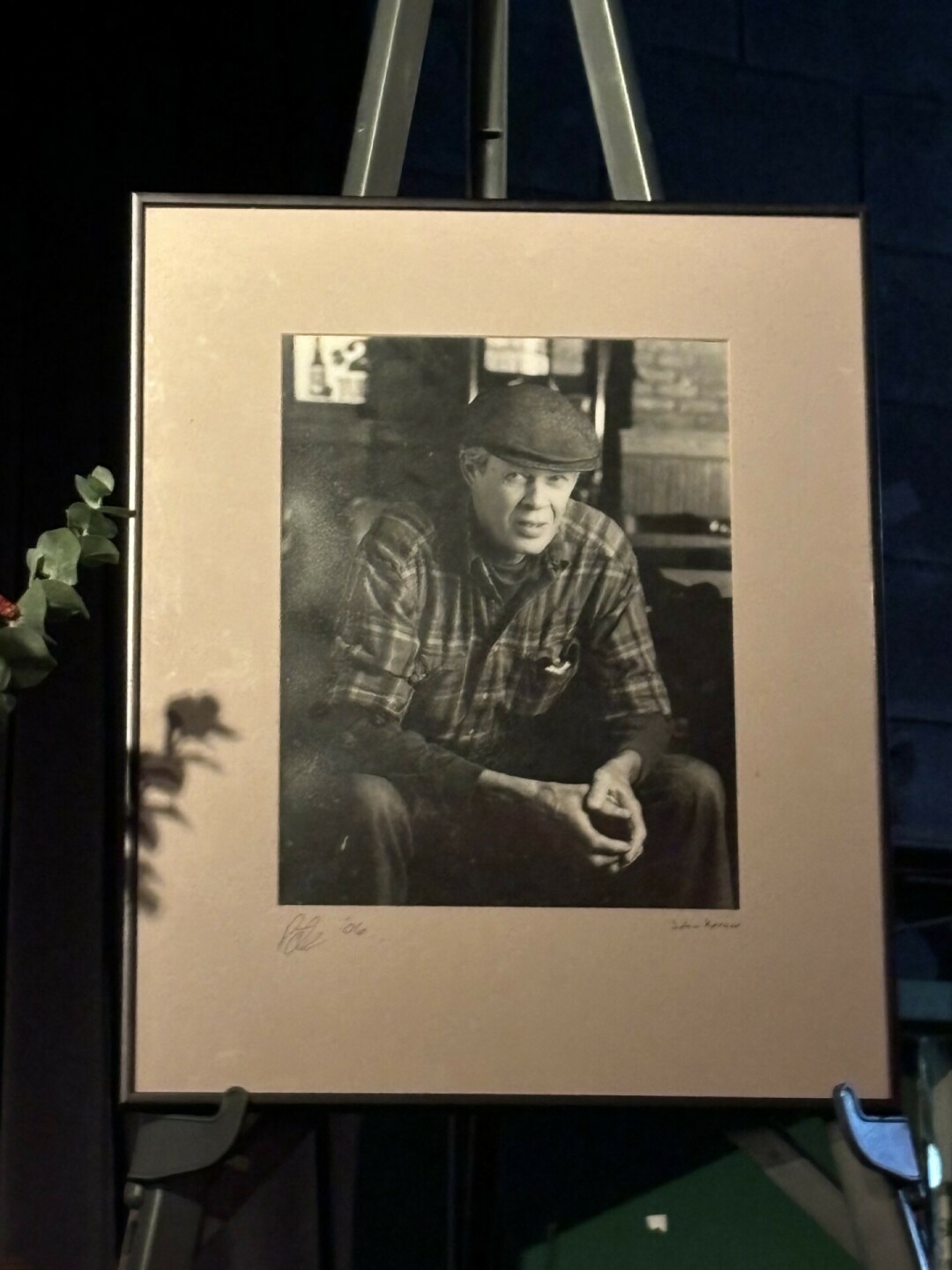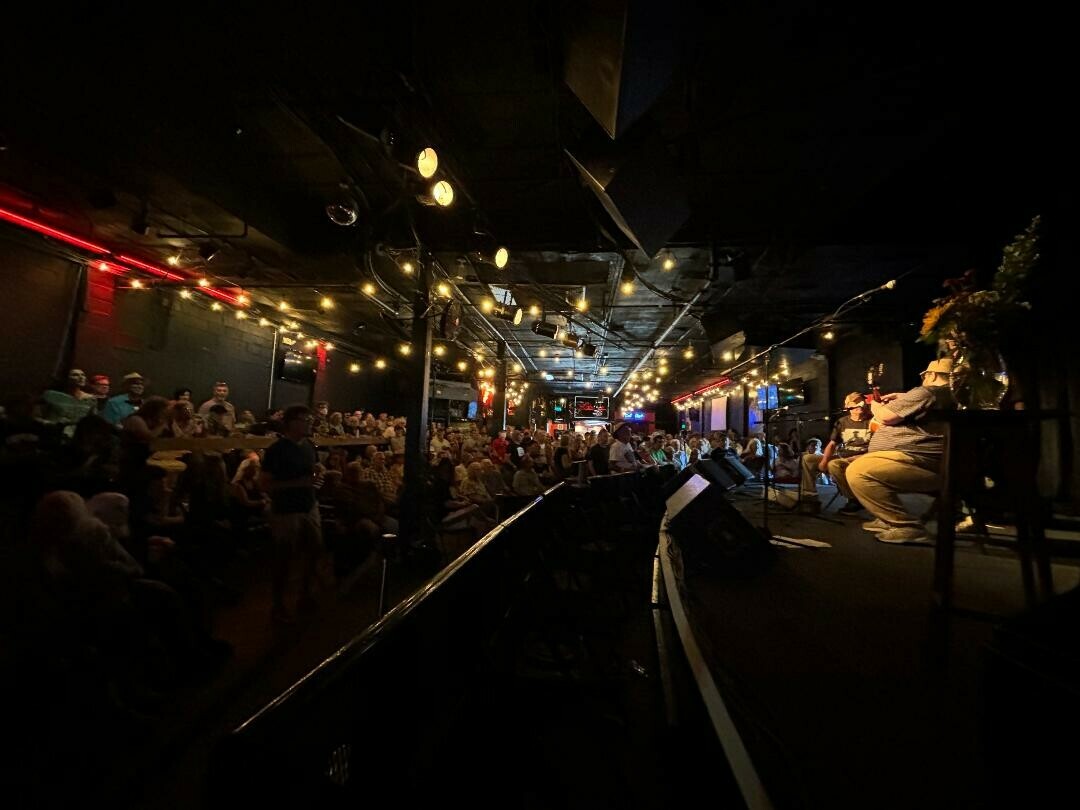News & Articles
Browse all content by date.

Photos by Jill Fisher.
The Cabooze, one of the renowned music venues on the West Bank in Minneapolis, was the scene for the “Remembrance and Celebration of Spider John Koerner” on June 23. As typically happens when a musician of note passes on, family, friends, colleagues and musicians were on hand to pay their respects, share their stories and play his music.
It was an interesting mix of folks that made their way to the Cabooze to do just that on this warm and sunny Sunday. The Curmudgeon and I weren’t the only Duluthians on hand that day – Paul Metsa was there (and performed), as was Kyle Orla, Jon Edwards and perhaps others I didn’t see. It was a special treat to see that Charlie Parr would be playing to honor his friend and mentor.
For those who aren’t familiar with Spider John Koerner (Aug. 31, 1938-May 18, 2024), he was a seminal folk blues artist who had a significant impact and influence on our native son, Bob Dylan, during his formative years in Minneapolis before heading to New York City in the early 60s. And then there was his connection with Charlie Parr, who greatly admired Spider John, becoming a close friend.

It was in my jugband days back in the 1990s that I came to know of Spider John through my familiarity with The Jim Kweskin Jugband. A friend reported that she saw Koerner play years ago at the Triangle Bar on West Bank at a Battle of the Jug Bands with a group called Outdoor John and the Sears Catalog. Unfortunately I never got to see Koener play live. But I can attest to the trio Koerner Ray & Glover being models for the kind of music our jugband played.
On this very special Sunday, people who knew and loved Spider John turned out to share their memories, imparting interesting, profound and funny insights into the life of this inimitable person. Musician Grant Johnson, who played with Spider John (and others such as Rich Mattson), helped organize and was emcee for the event.

Jack Klatt
A number of groups played in tribute to their late role model – the Cactus Blossoms, Pop Wagner, a foursome comprised of Tony Paul, Randy Webb, Dave Babb and Doug Anderson and solo performer Jack Klatt in addition to Metsa and Parr. Klatt performed Koerner and Willie Murphy’s “I Ain’t Blue” (recorded by Bonnie Raitt on her first album) that was wonderfully engaging and revealed the musical influence of Spider John.
But what I found most moving were the stories and tributes by those who knew Spider John, beginning with his son, Chris Kalmbach, who was not known to him until he finally tracked his father down as a 40-year-old. Chris told of how many “John Koerner” entries there were in New York phone books and city directories he had to sift through before discovering a gig he’d be playing. He bought a ticket to the show and approached him right before the concert to introduce himself, not knowing what Spider John’s reaction would be. As he told it, the hug he immediately received was so strong the harmonica rack that was hung around Spider John’s neck was shattered into metal bits.
Chris supplied some basic background information about his dad: He was born in 1938 in Rochester, New York, where he was raised except for two years when Koerner’s father, who worked for Eastman Kodak, moved to Tennessee to work on the Manhattan Project. He attended the University of Minnesota in Minneapolis as an engineering major but quit after he was introduced to folk music and a Burl Ives Songbook!
Koerner headed to Los Angeles to pursue music but ended up enlisting in the Marines. A serious car crash afforded him the opportunity to leave the military with an honorable discharge, after which he found his way back to Minneapolis. Chris did not get into the awards and accolades since he said all that can be found online. Even though an adult, Chris asked Koerner for fatherly advice and here’s what he received: “Marry the one who makes you feel the most comfortable.” Chris said he took that advice and was glad he did.
Other advice given by Spider John to one of the speakers was not to drink beer before a performance so as to avoid belching during a song! Emcee Johnson stated, “John didn’t write songs, he made them up.” Such were the shared reminiscences of his friends and fellow musicians.
Another story shared by Mj Mueller, widow of Dave Ray, was of Spider John’s ability to build things, beginning with model airplanes and included boat building, not to mention his tinkering and altering guitars to suit his idiosyncratic musical goals. She related how he had the opportunity to pilot a glider airplane one time (based on his understanding of aerial dynamics from model plane building!) and how he landed the glider in an unusual and risky way. Rather than increasing the size of the loops around the landing strip on the descent, he spiraled down “like a corkscrew.” Luckily he managed it without harm to himself or the plane, to the chagrin of experienced onlookers.
Lisa Hammer, former owner of Palmer’s Bar, spoke emotionally about Spider John saying that when buying the place, it was clear that he obviously came with the bill of sale for the property! And she claimed to have convinced Spider John, who had been performing solo for some time, to play with Charlie Parr back in 2012. The pairing resulted in a strong friendship, evidenced by his passing his irreplaceable Gretsch guitar (modified to a 12-string instrument) on to Charlie.
Although Spider John’s career waxed and waned, his influence was widespread, with acknowledgements by the likes of John Lennon and David Bowie. Within certain music circles he’s considered a hero. As Mark Moss, editor of American folk bible Sing Out! Magazine wrote: “Those first two Koerner, Ray & Glover records, especially, were an essential inspiration for a generation of players. No question.”

The crowd at The Cabooze
This was affirmed in the testimonial by Bonnie Raitt, sent by email to be read at the memorial:
“I’m sorry I couldn’t be with in person today, but I send you my best to you all.
“John and I became friends in Greenwich Village in 1969. A year later when he moved to Cambridge, that’s where I was living, he soon became a beloved part of our close musicians circle. When he wasn’t traveling we’d gather in our close bar, Jack’s Bar, for his regular Monday night gig and sit mesmerized, not quite believing one of our biggest heroes was in our midst.
“I’ve been under John’s spell ever since I first heard those Koerner Ray & Glover Blues Rags & Hollars albums as a teenage folk and blues hound. They showed us you can be white and still have some authenticity playing the blues if you were true to the music and not trying to be someone you’re not.
“No surprise he was a huge influence on Dylan, the Brits and so many other musicians all over. Through John’s Running Jumping Standing Still album with Willie Murphy I got turned on to the whole Minneapolis West Bank scene and I asked Willy to produce my first album back in 1970. Thanks to John I’ve been welcomed by the musicians’ community here and feel like it’s my second home.
“I admired him for always carving out his own path, covering great blues songs, reviving overlooked American folk songs and writing some of the most quirky wonderful songs of his own. As for his playing he literally created his own funky rhythmic guitar style and modified his own instruments – a total original. There’ll just never be anyone like him. I loved his sense of humor – cracked us all up. He told the best stories, was the most loyal and caring friend and family man. I loved gazing up at the stars hanging out in his cabin, in his canoe, at Palmer’s, at the Viking and the Triangle before that. I especially loved that he couldn’t have cared less about selling records or being hip. He was eternally hip – the real deal. I’m so grateful for our long dear friendship for our wonderful talks, right up to close before he left us. His serious illness caught us all by surprise, including him. But he had a great ‘so be it’ attitude about his prognosis. That will stay and move me always. It’s just like him to not want to make a big deal out of anything.
“I love you John and will miss you always. We were so lucky to have you and will just keep you alive with your music, our memories and our thanks. And you know they’ll be leaving that seat open for you at Palmer’s just in case, you never know.”

Dave Hundreiser and Charlie Parr
As the afternoon’s remembrances wound down Parr took the stage along with his “brother from another mother,” Dave Hundreiser, and the modified Gretsch guitar gifted to him by Spider John. (The gift of this guitar was both an honor to receive and a sign of trust that Parr would be a worthy steward of it.) The four Koerner tunes he played, “Good Time Charlie,“ “Running Jumping Standing Still,” “When First Unto This Country“ and “Summer of ’88” received an overwhelmingly enthusiastic response by the attendees of this life celebration.
Everyone seemed to hear the influence of Spider John in Charlie’s music and understand that Charlie is in his musical lineage. More significantly, it seems clear that Charlie and Spider John had (and continue to have) a deep soul connection. Here’s what Charlie posted on Facebook prior to the event: “I’m grateful…for my conversations with Spider John, even those early, awkward ones. I already miss knowing that he’s out there, even though I didn’t see him regularly, I miss knowing that I could. I can’t see his light here anymore, but I do see it alongside all of my friends and family whose lights are lit on a different plane.”
After several hours of heartfelt remembrances and a group performance by the participating musicians to end the memorial gathering, attendees were invited to Palmer’s Bar, just a few blocks away, for a potluck supper with the chance to continue conversations about Spider John on this gorgeous late Sunday afternoon. I’m sure all were united in their wishes for Spider John to Rest in Peace.
| Tweet |

